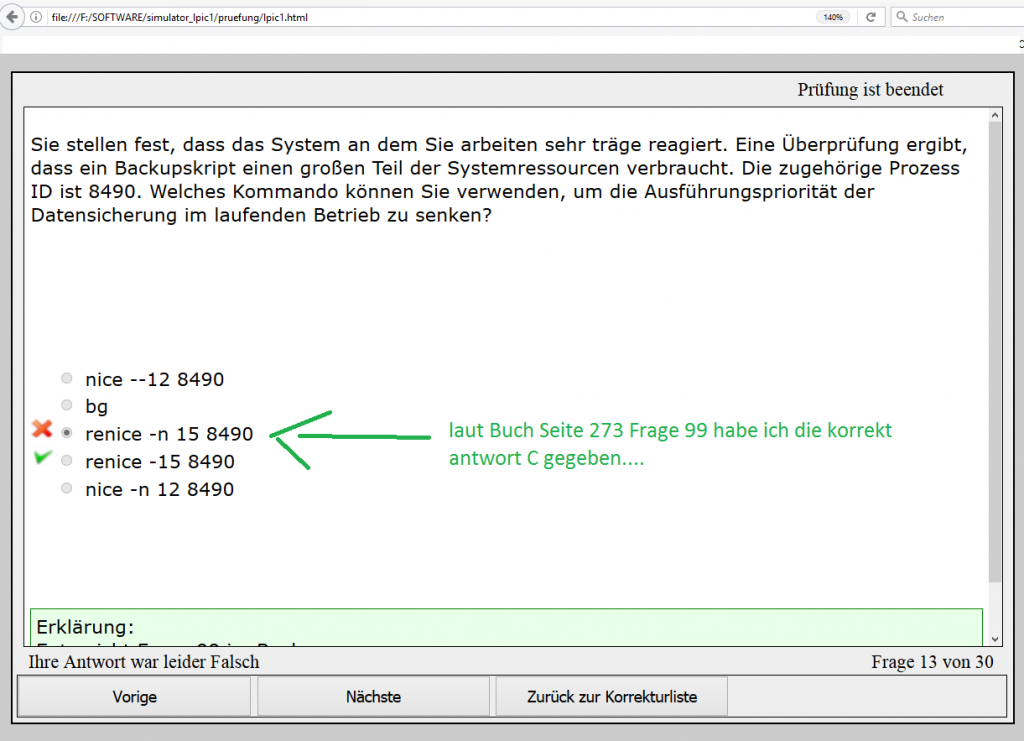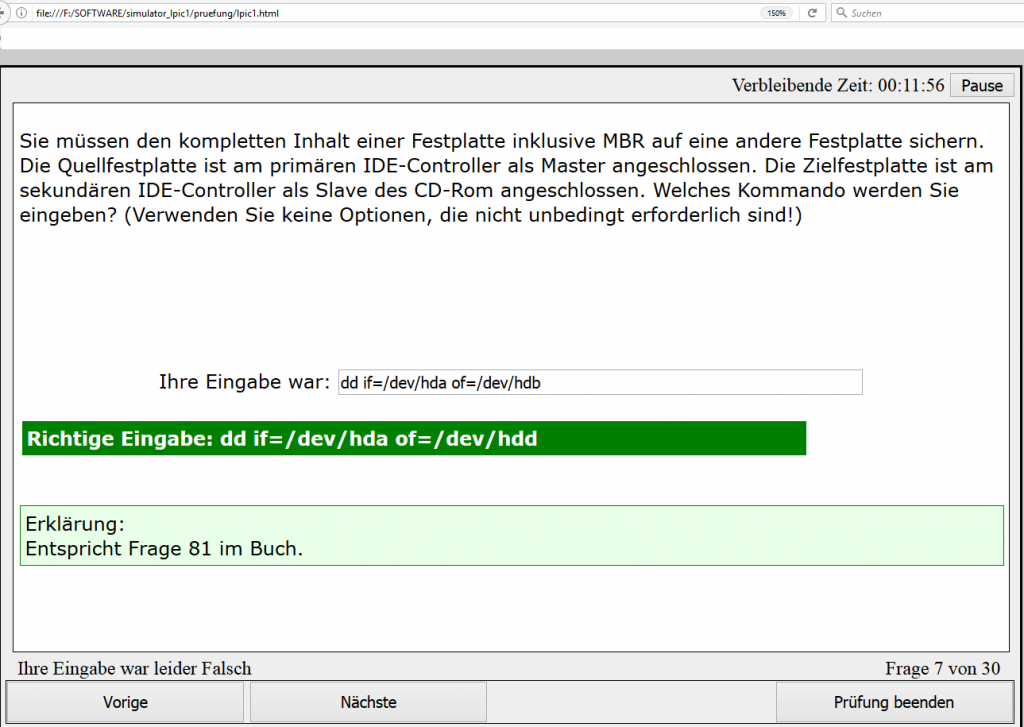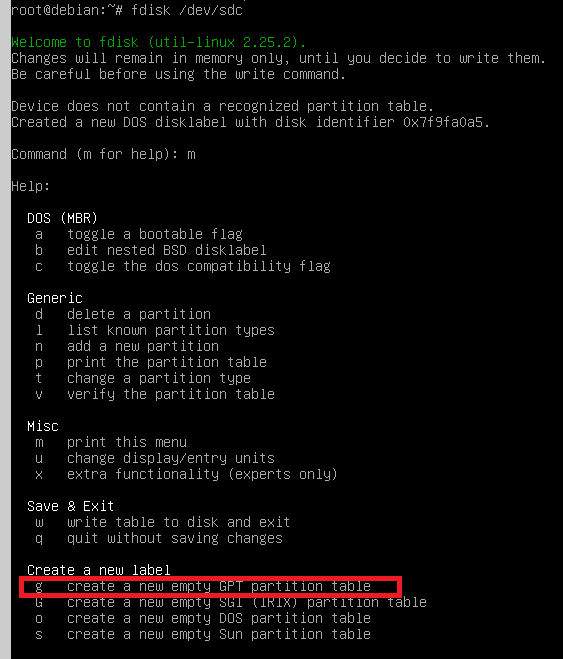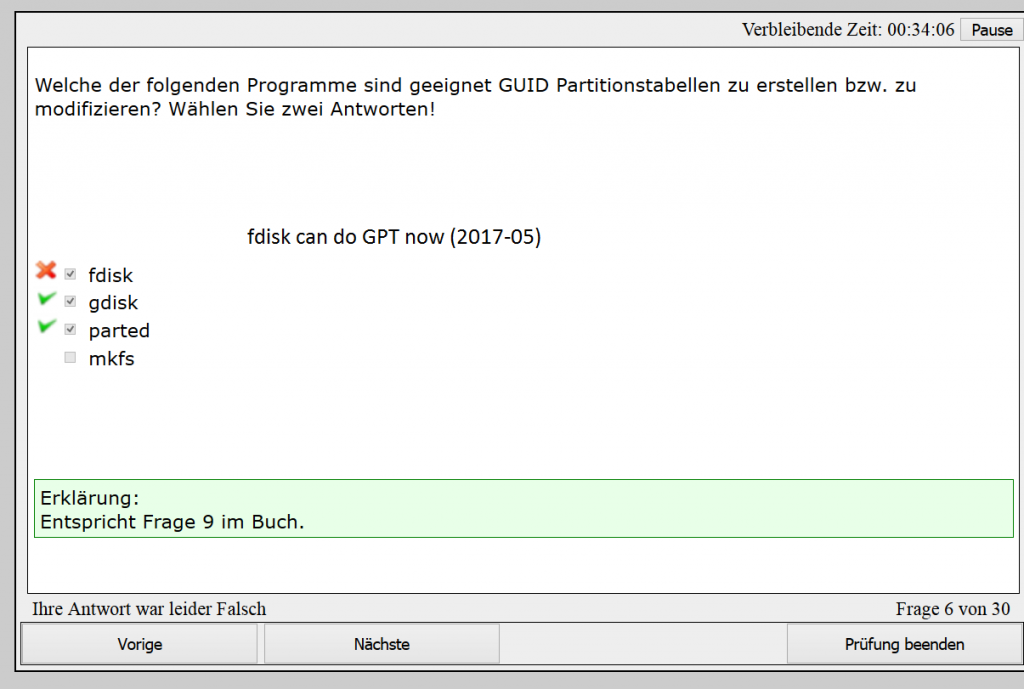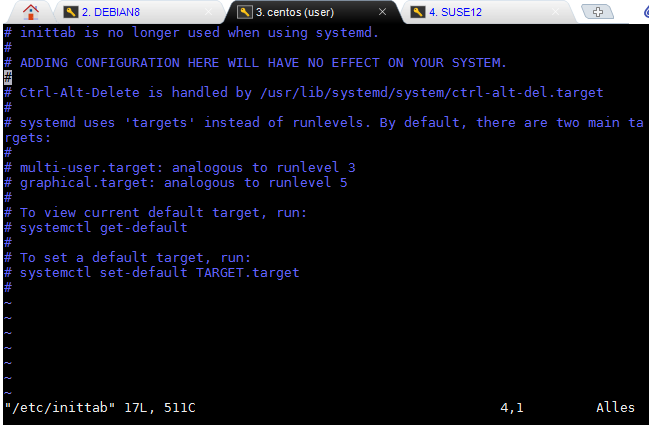Music that might motivate you to study:
humans are not machines… humans have emotions and motivations… machines (not yet).
Even StarTrek’s Android Data has problems with emotions like humor.
https://youtu.be/ioX5xJ_ug5Y
About the test:
The test will be in ENGLISH – there is NO GERMAN VERSION.
LPIC1 is two tests (101-400 and 102-400) that you take (probably) at two different days.
It is 60 questions each and you have 90minutes each.
Maximum score is 800, so you can get 13 Points for every question.
Passing score is 500 (63%)
“Fair but tough” is the idea – checkout http://www.lpi.org/value-of-certification/our-certification-development-standards
You will need to register and get an LPI-ID from https://cs.lpi.org/caf/Xamman/register
you can contact LPI at: info@lpi.org
PS: The test is not easy – 10 years of (apt, yum, rpm) Linux experience will help you more than any brain dumps. But well yes – while outdated brain dumps might help you with 10-20% of the questions – more recent brain dumps can cover 90%.
i had outdated braindumps for the first exam – passing score was 570 (71%) – had more recent one’s for the second passed with score 770 (96%) – so this clearly helped.
Objectives/Umfang/Anforderungen:
work through those objectives: Order: Depends – if you have enough time:
- work through topics starting with most important
- when finished – repeat the most important topics
if you do not have enough time:
- work through topics starting with least important – finish with most important – to have the most important knowledge most fresh/present
in any case:
- do all relevant most recent braindumps that can be found
(ordered after weight, weight = more questions on that topic will be asked)
Exam1of2 101-400
http://www.lpi.org/our-certifications/exam-101-objectives
Exam2of2 102-400
http://www.lpi.org/our-certifications/exam-102-objectives
the idea behind this list is – that if you start of with the least important topics and learn the most important topics right before the test – to have those in short-term memory as good as possible 😉
106.3 Accessibility – Weight: 1
o made notes on that topic?
o urban pinguin
o book
106.2 Setup a display manager – Weight: 1
o made notes on that topic?
o urban pinguin
o book
108.4 Manage printers and printing – Weight: 2
o made notes on that topic?
o urban pinguin
o book
106.1 Install and configure X11 – Weight: 2
o made notes on that topic?
o urban pinguin
o book
105.3 SQL data management – Weight: 2
o made notes on that topic?
o urban pinguin
o book
109.4 Configure client side DNS – Weight: 2
o made notes on that topic?
o urban pinguin
o book
107.3 Localisation and internationalisation – Weight: 3
o made notes on that topic?
o urban pinguin
o book
110.3 Securing data with encryption – Weight: 3
o made notes on that topic?
o urban pinguin
o book
110.2 Setup host security – Weight: 3
o made notes on that topic?
o urban pinguin
o book
110: Security
110.1 Perform security administration tasks – Weight: 3
o made notes on that topic?
o urban pinguin
o book
108.3 Mail Transfer Agent (MTA) basics – Weight: 3
o made notes on that topic?
o urban pinguin
o book
108.2 System logging – Weight: 3
o made notes on that topic?
o urban pinguin
o book
108: Essential System Services
108.1 Maintain system time – Weight: 3
o made notes on that topic?
o urban pinguin
o book
105.2 Customize or write simple scripts – Weight: 4
o made notes on that topic?
o urban pinguin
o book
105: Shells, Scripting and Data Management
105.1 Customize and use the shell environment – Weight: 4
o made notes on that topic?
o urban pinguin
o book
109.3 Basic network troubleshooting – Weight: 4
o made notes on that topic?
o urban pinguin
o book
109.2 Basic network configuration – Weight: 4
o made notes on that topic?
o urban pinguin
o book
109: Networking Fundamentals
109.1 Fundamentals of internet protocols – Weight: 4
o made notes on that topic?
o urban pinguin
o book
107.2 Automate system administration tasks by scheduling jobs – Weight: 4
o made notes on that topic?
o urban pinguin
o book
107: Administrative Tasks
107.1 Manage user and group accounts and related system files – Weight: 5
o notes
https://dwaves.de/2016/08/30/linux-user-and-group-management-create-new-user-adduser-delete-user-deluser-userdel-debian-suse-redhat-centos/
o urban pinguin
https://www.theurbanpenguin.com/107-1-manage-user-and-group-accounts-and-related-system-files/
https://youtu.be/BvScm5rffIc
o book
REAL Example questions from 101-400:
hover to show answer
/proc/interrupts
hover to show answer
16yy
hover to show answer
-rw-r--r-- 1 root root 2.0K Jun 1 10:49 /etc/passwd
SIGINT
LPI-Approved Material (UNTESTED!!!)
Mr Mallett aka The Urban Pinguin has made superb Youtube videos which 90% are still up to date (okay he is using SUSE11 recent is 12) – https://www.theurbanpenguin.com/lpi-training-from-theurbanpenguin/lpic-1-linux-server-professional/
never the less i am big fan of video2brain 🙂
I wonder why LPI.ORG is not doing any youtube videos for students to prepare for exams…. C’MON GUYS!
books are also okay… but they don’t have any moving pictures or pictures at all…
http://www.lpimarketplace.com/ – expensive 😀 – up to date?
 |
 |
 |
||
|
101-400 – LPIC-1 Exam 1 – eLearning Course and Lab Our Price: $279.99
|
102-400 – LPIC-1 Exam 2 – eLearning Course and Lab Our Price: $279.99
|
CompTIA Linux+ / LPIC-1 Cert Guide: (Exams LX0-103 & LX0-104/101-400 & 102-400) List Price: $49.99
Our Price: $42.49
You Save: $7.50
|
http://www.lpi.org/how-to-get-certified/preparing-for-my-exam
ebooks – pdfs – https://www.tuxcademy.org/media/lpic1/
contact: anselm@tuxcademy.org
Not so approved material:
Articles you should have read:
http://tldp.org/LDP/abs/html/globbingref.html
https://dwaves.de/2017/05/30/xargs/
https://dwaves.de/2017/05/31/signals-and-hotkeys/
https://dwaves.de/2017/05/31/what-filesystems-can-be-used-as-root-partition/
Books in German/Bücher:
die LPIC Prüfungen werden immer wieder überarbeitet – scheinbar zuletzt 2015 (!?) so schreibt jedenfalls das Buch “Sicher zur erfolgreichen Linux-Zertifizierung” von Harald Maaßen von 2016
Der CD liegt eine HTML-Basierte Examens-Test-Trainingssoftware bei – welche echt cool gemacht ist und wunderbar funktioniert.
Allerdings ist die Aktualität der Fragen fraglich.
Ausserdem habe ich dort einen Fehler entdeckt: z.B. nice -14 startet prozess mit niceness level 14, aber renice -14 setzt tatsächlich die niceness auf -14.
… auch werden die antworten nicht in randomisierter Reihenfolge ausgegeben… was einen “Auswendig-lern” Effekt nach sich zieht.
Materialien: Videos stand 2013
Training tools:
http://www.penguintutor.com/quiz/ – qualität: ?
http://www.aiotestking.com/linux/category/exam-101-400-lpi-level-1-exam-101/ – qualität: ?
http://www.exam-labs.com/exam/101-400 – qualität: ? – kosten: man muss sich registrieren
www.lpi-academy.de/sim/exam/ – qualität: Gut gemacht, inhaltich veraltet, Stand/Version vermutlich Jahr 2000, es wird nach der LILO-config datei gerfrag…?
Spitzfindige Beispielfrage: (welche aber so jedenfalls in 101-400 bei mir nicht dran kam)
Was bewirkt das folgende Kommando?
bla | tee blubb fasel
-
- Die Ausgabe von bla wird von tee in die Datei blubb fasel geschrieben und außerdem auf der Standardausgabe geliefert
- Die erste Hälfte der Ausgabe von bla wird nach blubb geschrieben, die zweite nach fasel
- Die Ausgabe von bla wird von tee in die Dateien (PLURAL) blubb und fasel geschrieben und außerdem auf der Standardausgabe geliefert
- Gar nichts; tee erlaubt nur einen Parameter
Alternative?
Training
With the Linux server market poised to reach $50 billion dollars in three years and the explosion of the embedded market, well-trained Linux developers and Linux system administrators are in high demand.
The Linux Foundation is meeting this demand with a Linux Training program that is vendor-neutral, technically advanced and created with the actual leaders of the Linux development community. With online Linux training, classroom Linux training and on-site Linux training course offerings, The Linux Foundation courses can keep you and your developers ahead of the curve on Linux essentials.
Get started by watching one of our Free Linux Training Tutorials, by requesting a quote for Corporate Linux Training or by enrolling in one of the Linux Training courses listed below.
The Linux Foundation is also now offering its Introduction to Linux course (LFS101) for free as a Massive Open Online Course with EdX. For more information and to register, visit the EdX website.
This two day course is a condensed and intensive version of our soon to be offered full four-day class.
SDN (Software Defined Networking) abstracts networking infrastructure away from the actual physical equipment. This allows network system administrators to maintain the networking environment across mulitple vendors and hardware, and operating systems and versions.
OpenDaylight is an open networking platform that enables SDN and constructs a solid foundation for NFV (Network Functions Virtualization) for all network sizes.
Students will learn KVM from the ground up with a focus on QEMU and libvirt, as well as Xen, and will understand how these and other related open source components can be assembled to create a virtual IT infrastructure. There is a focus on practical deployment skills, securing the virtual infrastructure, and administering solutions. There will also be detailed material about using containers. There are low-level lab exercises focused on virtual images and snapshots, deployment, VM creation and maintenance, integration with networking infrastructure, device pass-through and more.
Obtain a solid understanding of embedded development using the Yocto Project, including the Poky Reference Distribution and Bitbake, the use of emulators, building images for multiple architectures and the creation of board support packages (BSP).
Get advanced Linux training on the key steps to developing an embedded Linux product. Gain real world experience through extensive hands-on practice with target devices.
Learn the basic methods and internal infrastructure of the Linux kernel, grasping both the theoretical and practical underpinnings.
The need for sysadmins with advanced administration and networking skills has never been greater, and competition for people with experience is fierce. Whether you’re looking for expert test prep for the Linux Foundation Certified Engineer certification, need training to help transition to Linux from other platforms, or you’re just brushing up on these vital admin and networking skills, this course will teach you what you need to know.
Linux is exploding, and the demand for Linux developers has never been stronger. This course will introduce you to the world of Linux development and give you the background and training you need to start working with Linux. If you’ve been thinking about getting into Linux development, this is the best place to start!
Learn the methods and internal infrastructure of the Linux kernel, focussing on the important tools used for debugging and monitoring the kernel, and how security features are implemented and controlled.
This course helps you master the tools used by system administrators in enterprise Linux environments, including maintaining software and hardware, updating, configuring, troubleshooting and securing systems, using a variety of Linux enterprise distributions.
The need for sysadmins with advanced administration and networking skills has never been greater, and competition for people with experience is fierce. Whether you’re looking for expert test prep for the Linux Foundation Certified Engineer certification, need training to help transition to Linux from other platforms, or you’re just brushing up on these vital admin and networking skills, this course will teach you what you need to know.
liked this article?
- only together we can create a truly free world
- plz support dwaves to keep it up & running!
- (yes the info on the internet is (mostly) free but beer is still not free (still have to work on that))
- really really hate advertisement
- contribute: whenever a solution was found, blog about it for others to find!
- talk about, recommend & link to this blog and articles
- thanks to all who contribute!



